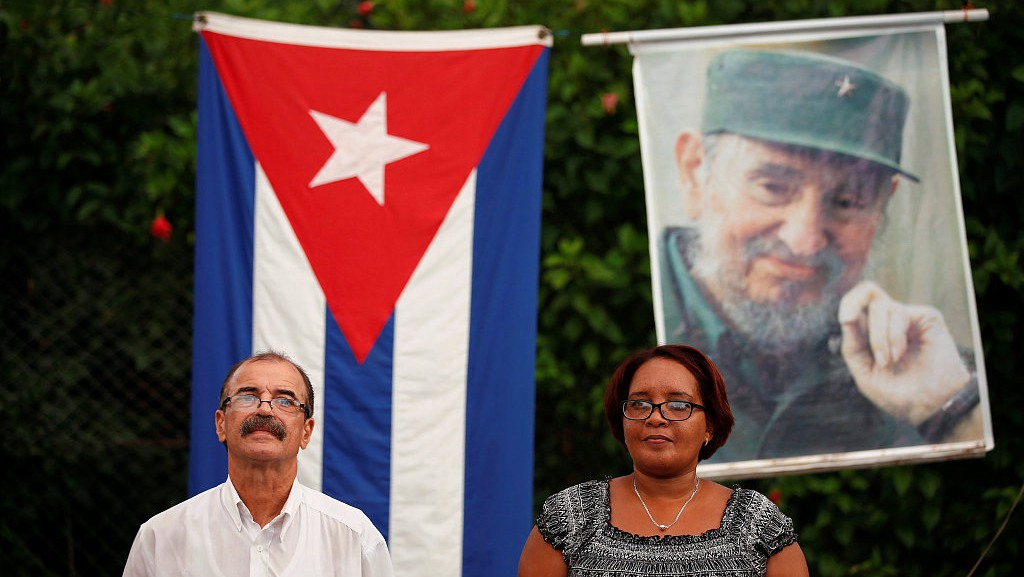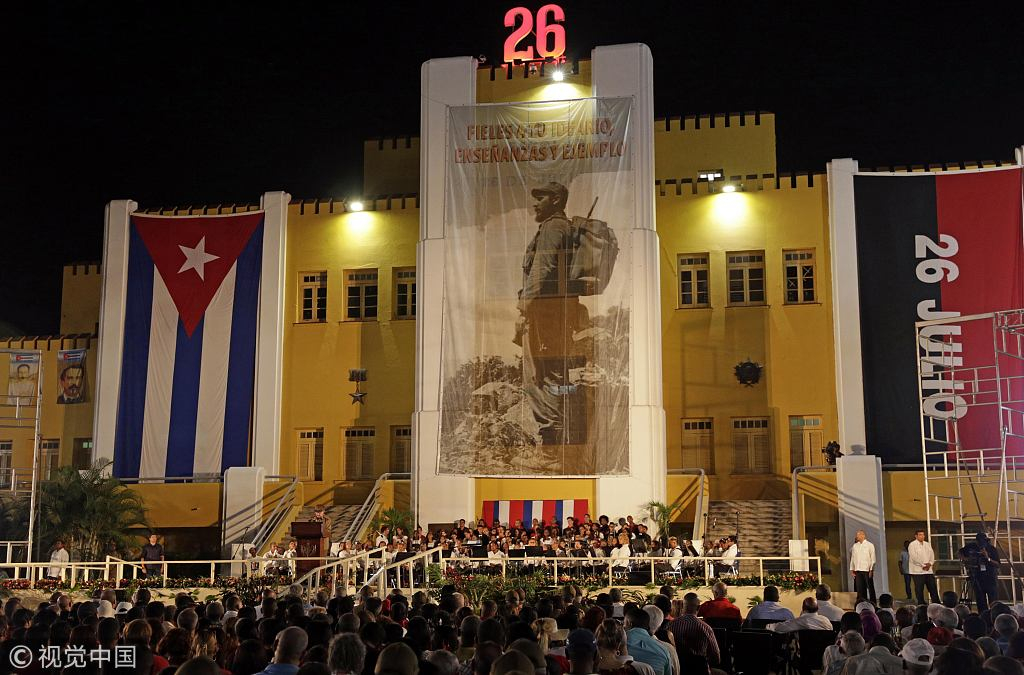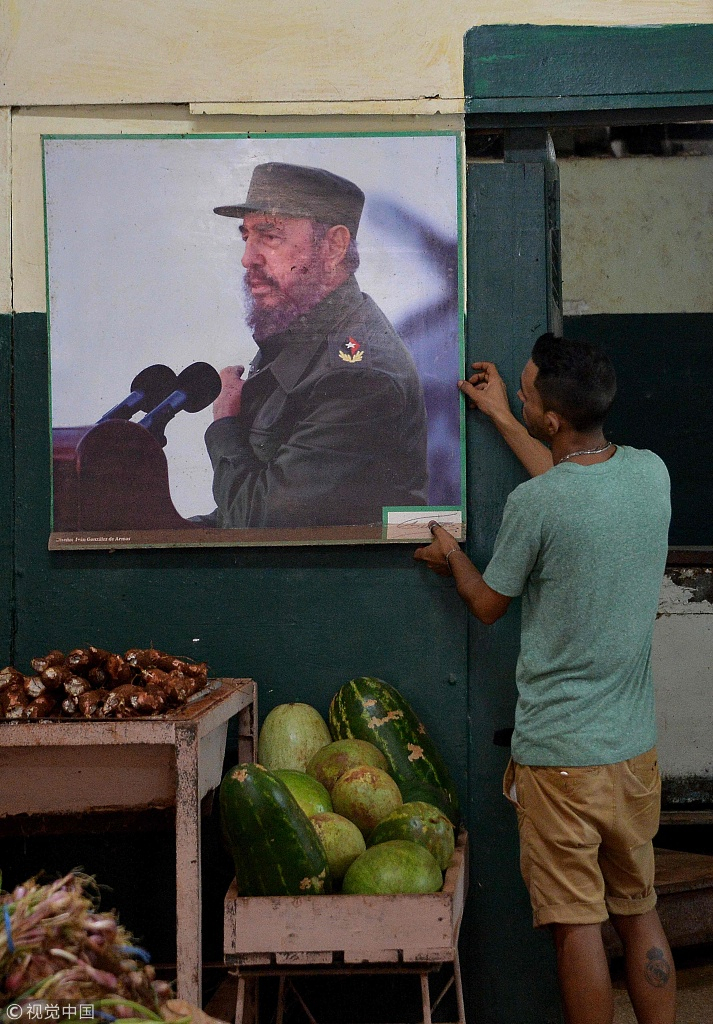
Opinion
12:11, 26-Feb-2019
What does the new constitution mean for Cuba?
Updated
16:48, 21-Apr-2019
Pan Deng

Editor's Note: Pan Deng is a member of the Academic Committee at the Charhar Institute and executive director of the Latin America and Caribbean Region Law Center of China University of Political Science and Law. The article reflects the author's opinion, and not necessarily the views of CGTN.
Cuba has ratified a new constitution on February 25. The Communist Party of Cuba initiated the constitutional revision work as early as May 2013. Since the second half of last year, the draft text has undergone two deliberations at the National Assembly of People's Power and a national discussion for more than three months. Now this country of the West Indies has finally ushered in an era under the new constitution. Going forward, the Cuban people will continue with their socialist development with new leadership elected based on the Magna Carta.

Cubans vote on the new constitution against the backdrop of an image of late revolutionary leader Fidel Castro, February 24, 2019. /VCG Photo
Cubans vote on the new constitution against the backdrop of an image of late revolutionary leader Fidel Castro, February 24, 2019. /VCG Photo
The 1976 constitution
The previous constitution of Cuba was enacted in 1976 and was revised twice in 1992 and 2002. This constitution stipulated that the National Assembly was the highest authority and has established a “four-in-one” leadership system where the highly-respected ruling party leader was also the Head of State, the Chief of the Permanent Organ of the National Assembly, Head of Government and Armed Commander.
This institutional arrangement and practice was an inevitable choice under the conditions of that time, ensuring that under the pressure of long-term blockade, containment and peaceful transformation, Cuba could concentrate and mobilize as many resources as possible and guide its people through various challenges. In the past forty years, Cuba has managed to build upon its achievements of the revolution and continue to make progress. Therefore, the importance of the 1976 constitution should be fully recognized.
In the late 1980s and early 1990s, the international situation witnessed profound changes as the Soviet Union and Eastern Europe experienced drastic transitions. Cuba was in an unprecedented predicament. At that time, the leadership of this country was composed of senior leaders of the Cuban revolution of the 1950s. It became one of the most pressing issues for Cuba to find younger officials to join the administration and transfer power from one generation of leaders to another while ensuring the fundamental political system was intact.
Since then, a large number of young people had taken up major tasks at the grassroots level. In 2006, Fidel Castro was hospitalized and handed over the authority of the President of the Council of State to Raul Castro according to the constitution. Under the support of the older generation of revolutionaries, young officials born after the victory of the revolution gradually assumed important leadership positions of the Party and the state in the sixth and seventh Congress of the Communist Party of Cuba and the Ninth National Assembly.
In April last year, the 58-year-old Miguel Díaz-Cane was elected President of the Council of State and became the Head of State. The new Council of State that came into power at the same time was made up of members with an average age of 54.
Most of the new generation of state leaders were born in the period of socialist development in Cuba. They have strong political convictions and rich working experience at both the central and local level. The geopolitics, historical background and stage of development at the time required Cuba to update its national leadership structure in order to guarantee the continuity of the revolutionary cause and long-term stability of the country at the institutional level.
The new constitution has further increased the state institutions, improved the relationship and division of labor between state organs, and codified widely-practiced rules of appointing top leaders and managing the relationship between the central and local authorities into constitutional norms. It serves as an important institutional bulwark in ensuring strong leadership after the elderly revolutionaries gradually stepped down.

Cubans celebrate the 65th anniversary of Fidel Castro's rebels attack on the Moncada barracks in Santiago de Cuba, July 26, 2018. /VCG Photo
Cubans celebrate the 65th anniversary of Fidel Castro's rebels attack on the Moncada barracks in Santiago de Cuba, July 26, 2018. /VCG Photo
The new constitution
The reform of the constitution by Cuba this time is not a fine-tuning of details, but a thorough rewriting of the whole content. Compared with the previous constitution, in addition to major changes to the structure of state institutions, the new constitution has made significant adjustments in guiding ideology, civil rights, economic systems, and foreign relations. But there is no doubt that the new constitution still upholds Communism and the irrevocability of the socialist system, and emphasizes that the construction of socialism is the essential purpose of the state. In addition, the new constitution still insists on the uniqueness of the Communist Party Cuba and the combination of legislative and executive powers while continuing to champion the socialist economic system based on public ownership. It constitutes a strong rebuttal to the previous conjecture of an imminent change of regime in Cuba.
Just as a member of the constitution revision group, Homero Acosta Álvarez, noted in July 2018 in the National Assembly's remarks on reform of the constitution, Cuba's constitutional amendment took socialist countries including China as examples. Therefore, there are many similar statements between the two in terms of establishing the leadership of the Party, building a socialist country under the rule of law, expanding civil rights and grassroots democracy, improving the state institutional system, enhancing productivity, recognizing the role of the market and the private sector in the economy and making overall plans for utilizing domestic and foreign resources.
In addition, Cuba has also referenced and followed some constitutional traditions in Latin America. For example, once the constitution is adopted by the constitutional authority, it must go through a referendum. The resemblance is also reflected in its emphasis on the determination to unite with the Latin American people and promote regional integration.
Of course, this new constitution is the ultimate embodiment of the Cuban people's memory of their struggles and accomplishments, as it sets out the fundamental systems and tasks of Cuba and is filled with distinctive Cuban characteristics. For example, in terms of the guiding ideology, the Fidelista Communist Party is written into the new constitution. In terms of ownership, the new constitution promulgates bold reforms of the existing system and pays great attention to minimizing the ramifications and avoiding turmoil.
In terms of wealth distribution, there is certain liberalization, but strict control is still maintained over the non-public economy to fortify the centralized distribution. In terms of the relationship between the central government and local authorities, there will be no people's congress at the provincial level, and the provincial governors are elected by the delegates of the corresponding municipal people's power assemblies, at the proposal of the President of the Republic.
These distinctive Cuban features provide experience in governance to countries with similar national conditions, and offer a case in point for mutual learning on how the socialist countries enrich and develop the Marxist doctrine of the state.

A man arranges a poster of late Cuban leader Fidel Castro at a market in Havana, Cuba, on August 10, 2018. /VCG Photo
A man arranges a poster of late Cuban leader Fidel Castro at a market in Havana, Cuba, on August 10, 2018. /VCG Photo
Although the new constitution only adopts principled provisions in many aspects such as the economic system and civil rights, and is to be supplemented by future legislation, the new national institutions and leadership systems set forth by the new constitution have been established. The issue of successors repeatedly discussed has been institutionalized.
I believe that the updating of Cuba's socio-economic model has begun, which will be carried out steadily and prudently within the carrying capacity of the society under the leadership of a new generation of leaders, as is demonstrated in Raul Castro's philosophy of “Without Haste But Without Pause”.
(If you want to contribute and have specific expertise, please contact us at opinions@cgtn.com.)

SITEMAP
Copyright © 2018 CGTN. Beijing ICP prepared NO.16065310-3
Copyright © 2018 CGTN. Beijing ICP prepared NO.16065310-3